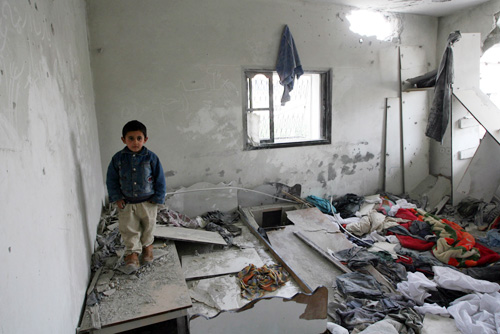Read more Gaza reports
“Scenes of destruction are everywhere. When you walk in the streets you see many damaged buildings. Some of them are totally damaged and cannot be repaired. They need to be rebuilt anew.
“Nobody leaves his or her house unless there is something extremely urgent. The last time I went out was before yesterday to refill my car with fuel. But I go to visit my mother who lives nearby to check on her. That day I passed by a bakery where I had to stand in a long queue to buy some bread. We usually wait for an hour in queues to buy bread as only two or three bakeries in our area are still functioning. When it is your turn, the quantity they give you depends on the available supply of wheat and cooking gas.
“Prices [of commodities] are rising. In grocery shops some items are available and some are not. And even some of what is available might have become spoilt now, after three days of continuous electricity cuts in our area. I heard that some areas have had no electricity since the start of the bombardment nine days ago.
“When the electricity is cut, water supplies are directly affected. We use electricity to pump water from tanks on the ground to rooftop tanks - from where it is distributed to the different flats… Now even if you have water, you might not be able to use it unless you try to carry it. Even when you manage to get water, it is difficult to take a shower in very cold water… Solar heating systems don’t work properly in winter.
“My four children are terrorised because of the attacks - especially the youngest [two] aged six and 11. With severe bombardments outside and lack of electricity inside, they refuse to go to the toilet on their own at night. They want someone to accompany them. We are also subject to psychological pressure. A few hours back I heard that a friend had died.
“January is one of the coldest months of the year… but in these cold conditions, we have to leave windows partially open to prevent them from shattering in the bombardments.
“Despite this extremely difficult situation, I fear nothing now and do not have any concerns. I believe in God and that everyone has to die one way or another. It is better to die in this honourable way. These are not my personal beliefs, all Gazans believe the same.”
dvh/ar/cb
This article was produced by IRIN News while it was part of the United Nations Office for the Coordination of Humanitarian Affairs. Please send queries on copyright or liability to the UN. For more information: https://shop.un.org/rights-permissions





